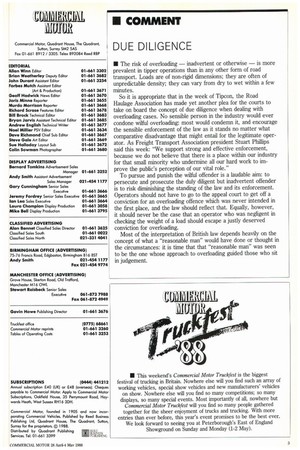DUE DILIGENCE
Page 5

If you've noticed an error in this article please click here to report it so we can fix it.
• The risk of overloading — inadvertent or otherwise — is more prevalent in tipper operations than in any other form of road transport. Loads are of non-rigid dimensions; they are often of unpredictable density; they can vary from dry to wet within a few minutes.
So it is appropriate that in the week of Tipcon, the Road Haulage Association has made yet another plea for the courts to take on board the concept of due diligence when dealing with overloading cases. No sensible person in the industry would ever condone wilful overloading: most would condemn it, and encourage the sensible enforcement of the law as it stands no matter what comparative disadvantage that might entail for the legitimate operator. As Freight Transport Association president Stuart Phillips said this week: "We support strong and effective enforcement, because we do not believe that there is a place within our industry for that small minority who undermine all our hard work to improve the public's perception of our vital role."
To pursue and punish the wilful offender is a laudable aim: to persecute and prosecute the duly diligent but inadvertent offender is to risk diminishing the standing of the law and its enforcement. Operators should not have to go to the appeal court to get off a conviction for an overloading offence which was never intended in the first place, and the law should reflect that. Equally, however, it should never be the case that an operator who was negligent in checking the weight of a load should escape a justly deserved conviction for overloading.
Most of the interpretation of British law depends heavily on the concept of what a "reasonable man" would have done or thought in the circumstances: it is time that that "reasonable man" was seen to be the one whose approach to overloading guided those who sit in judgement.




















































































































































